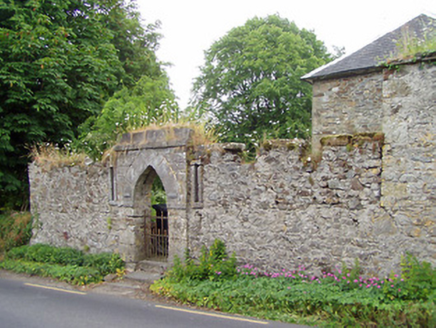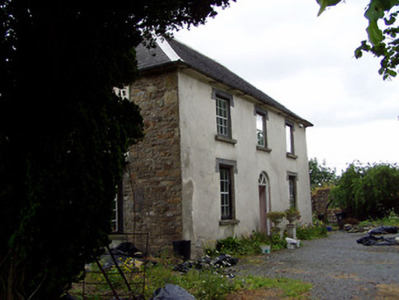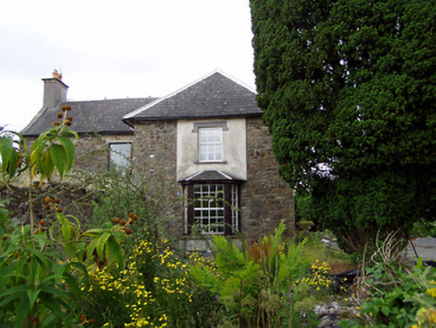Survey Data
Reg No
22205402
Rating
Regional
Categories of Special Interest
Architectural, Artistic
Previous Name
Hill View
Original Use
House
In Use As
House
Date
1810 - 1830
Coordinates
222750, 148891
Date Recorded
21/06/2005
Date Updated
--/--/--
Description
Detached three-bay two-storey house, built c. 1820, having two-bay two-storey return to rear with two-bay lean-to to west, and canted bay window to east. Hipped slate roof with rendered chimneystacks and overhanging sheeted eaves with cast-iron brackets, pitched slate roof to return and slate roof to lean-to. Coursed rubble limestone and sandstone masonry walls, rendered to façade. Square-headed openings with replacement uPVC windows and having decorative render label mouldings to façade and upper gables, all with limestone sills. Hipped slate rooflet to canted bay window. Round-headed door opening with spoked fanlight and timber panelled door. Roughcast render over rubble limestone and sandstone boundary walls having pointed arch pedestrian gateway with dressed limestone voussoirs and parapet and wrought-iron gate with flanking arrow loop openings and limestone steps. Crenellations to south boundary wall and remains of crenellations to north. Square-headed opening to south-west with cast-iron gate leading to rear.
Appraisal
This house, with its regular form and symmetry of design is a fine example of the Georgian style. The diminishing windows are a typical feature of such houses in South Tipperary and add interest to the façade whilst counterbalancing the horizontality of the eaves. Ornamentation is focused on the windows of the house with the decorative render mouldings and on the entrance with its simple, subtly decorative fanlight. The bay window, which is well crafted, adds interest to the rear elevation. The site retains its boundary walls with decorative crenellations and ornate Gothic style pointed arch opening. This juxtaposition of styles is an unusual feature, the Gothic style entrance to a Georgian style house serves as a reminder of the nineteenth century penchant for Revival architecture.





